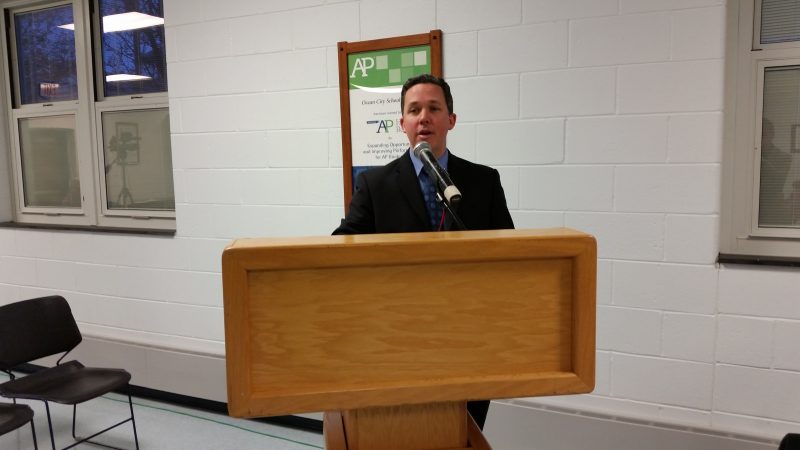Board of Education members Joseph Clark and Cecilia Gallelli-Keyes said the new policy is proactive.
 By Donald Wittkowski
Joseph S. Clark Jr., the president of the Ocean City Board of Education, says he knows of five people who have died of a drug overdose in just the past few months.
Although none of those people were local students, the possibility of drug overdoses occurring in Ocean City’s schools prompted the Board of Education to adopt a new policy Wednesday night to equip the school district with a potentially life-saving opioid antidote.
“We have to be proactive,” Clark stressed.
Cecilia Gallelli-Keyes, a school board member, said the policy recognizes the drug crisis in other parts of Cape May County and the possibility it could spread to Ocean City.
“We don’t have a problem,” she said, referring to Ocean City. “But Cape May County has a big heroin problem. We want to prepare ourselves.”
Both Clark and Gallelli-Keyes said the opioid policy has been met with widespread support in the local community.
“I’m glad that we, as a district, are doing something,” Gallelli-Keyes said.
The new policy, she added, is effectively “opening our eyes” to the scourge of drugs and what can be done to potentially save lives.
By Donald Wittkowski
Joseph S. Clark Jr., the president of the Ocean City Board of Education, says he knows of five people who have died of a drug overdose in just the past few months.
Although none of those people were local students, the possibility of drug overdoses occurring in Ocean City’s schools prompted the Board of Education to adopt a new policy Wednesday night to equip the school district with a potentially life-saving opioid antidote.
“We have to be proactive,” Clark stressed.
Cecilia Gallelli-Keyes, a school board member, said the policy recognizes the drug crisis in other parts of Cape May County and the possibility it could spread to Ocean City.
“We don’t have a problem,” she said, referring to Ocean City. “But Cape May County has a big heroin problem. We want to prepare ourselves.”
Both Clark and Gallelli-Keyes said the opioid policy has been met with widespread support in the local community.
“I’m glad that we, as a district, are doing something,” Gallelli-Keyes said.
The new policy, she added, is effectively “opening our eyes” to the scourge of drugs and what can be done to potentially save lives.
 Board of Education members Joseph Clark and Cecilia Gallelli-Keyes said the new policy is proactive.
Now that the board has approved the policy, the next step calls for the Ocean City school physician to prescribe which antidote will be used for drug overdoses and to determine who will administer it, Clark said.
School officials have discussed the possibility of equipping the school nurse with the antidote, but the physician still must finalize the overdose procedures, Clark explained.
Board of Education members Joseph Clark and Cecilia Gallelli-Keyes said the new policy is proactive.
Now that the board has approved the policy, the next step calls for the Ocean City school physician to prescribe which antidote will be used for drug overdoses and to determine who will administer it, Clark said.
School officials have discussed the possibility of equipping the school nurse with the antidote, but the physician still must finalize the overdose procedures, Clark explained.
 Timothy E. Kelley, school board administrator, outlined the proposed 2017-2018 budget.
Timothy E. Kelley, the school board administrator, said the principal reason for the tax increase was a decline in tuition revenue from two of Ocean City’s sending districts – Upper Township and Sea Isle City – caused by their falling student population.
In his budget presentation to the board, Kelley said tuition revenue is dropping to $11.7 million in 2017-2018 compared to $13.3 million in the 2016-2017 school year.
To help offset the decline in tuition revenue, the district will tap about $2.1 million from its fund balance, essentially its savings account, Kelley said.
School districts are required to have balanced budgets. For 2017-2018, Ocean City is receiving the same amount of state aid, about $3.8 million, as last year to help pay for its expenses.
Maintenance and capital projects at Ocean City’s primary, intermediate and high schools will add to the budget. Among them, sewer repairs at the intermediate school will probably cost in the hundreds of thousands of dollars, Kelley said.
The school board has scheduled a public hearing and final vote on the budget for its April 26 meeting.
Jacqueline McAlister, the board’s vice president, said the budget maintains Ocean City’s high quality of education while increasing taxes by only a small amount – a feat she called “superb fiscal management.
Timothy E. Kelley, school board administrator, outlined the proposed 2017-2018 budget.
Timothy E. Kelley, the school board administrator, said the principal reason for the tax increase was a decline in tuition revenue from two of Ocean City’s sending districts – Upper Township and Sea Isle City – caused by their falling student population.
In his budget presentation to the board, Kelley said tuition revenue is dropping to $11.7 million in 2017-2018 compared to $13.3 million in the 2016-2017 school year.
To help offset the decline in tuition revenue, the district will tap about $2.1 million from its fund balance, essentially its savings account, Kelley said.
School districts are required to have balanced budgets. For 2017-2018, Ocean City is receiving the same amount of state aid, about $3.8 million, as last year to help pay for its expenses.
Maintenance and capital projects at Ocean City’s primary, intermediate and high schools will add to the budget. Among them, sewer repairs at the intermediate school will probably cost in the hundreds of thousands of dollars, Kelley said.
The school board has scheduled a public hearing and final vote on the budget for its April 26 meeting.
Jacqueline McAlister, the board’s vice president, said the budget maintains Ocean City’s high quality of education while increasing taxes by only a small amount – a feat she called “superb fiscal management.